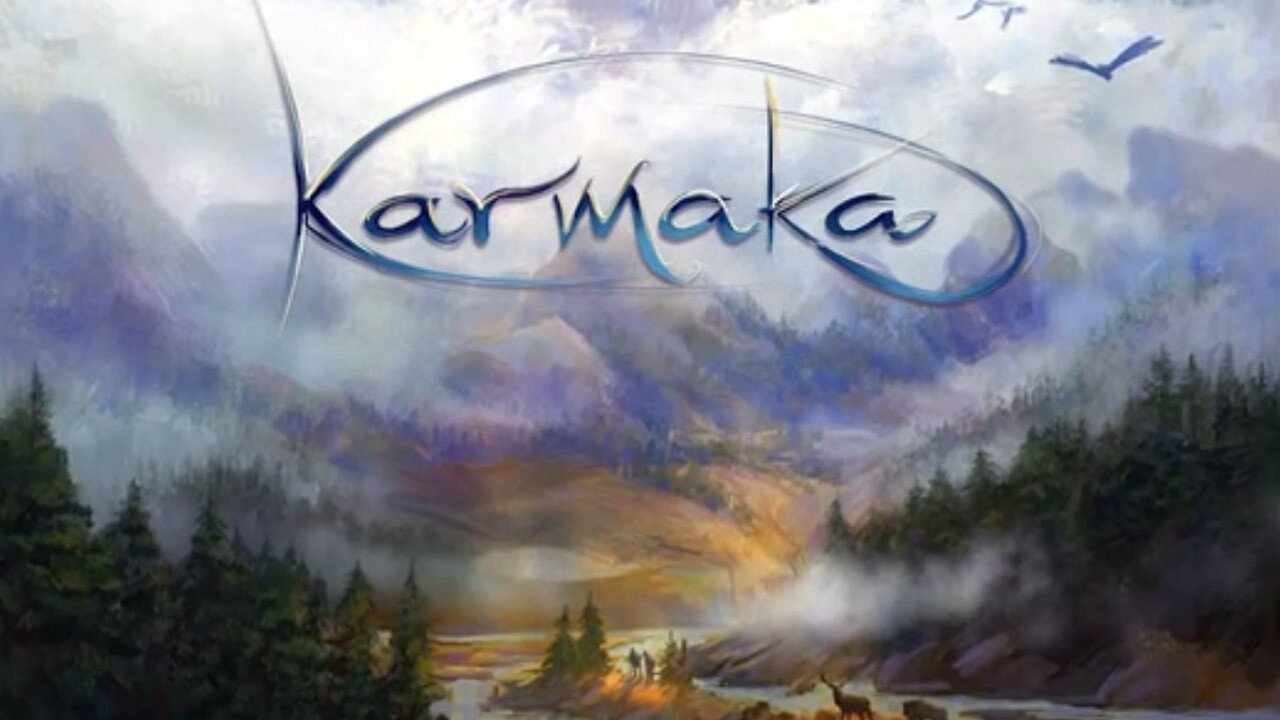Perhaps it was karma rewarding me for sending out to the universe positive vibes, for the sunrays greeted me the moment I stepped out of Ossington station on a Friday morning. I was on my way to a local café/restaurant called Dooney’s, located near Bloor and Ossington. It was a couple of minutes close to 10 a.m.—that’s when Dooney’s was open for business and served as the setting for my interview—so I waited patiently for my interviewees, Dave Burke and Marco Bucci. Burke and Bucci, along with Eddy Boxerman in B.C., joined together to create a tactical card game called Karmaka, which Burke says it’s a unique term for someone who practices karma (think karate-ka, practitioner of karate). According to Karmaka’s Kickstarter campaign website, players start off as lowly dung beetles; life after life—or hand after hand—these dung beetles work their way up the karmic ladder in an effort to see which one reaches Transcendence first. The concept of karma in a tabletop game setting was quite interesting, and when Burke and Bucci arrived on time, we settled inside Dooney’s to talk more about Karmaka over breakfast.
https://www.youtube.com/watch?v=W5dJrfXSBZI
Burke says he and Boxerman made these prototype versions of Karmaka, something with a higher fidelity, so that they can show the game to reviewers and previewers. As the Kickstarter campaign launched Jan. 19 (and running until Feb. 18), Burke says one way to improve a project’s appearance is by getting third-party opinions on the project. For Karmaka, Burke and Boxerman made a bunch of prototypes and reached out to different tabletop and board game bloggers, as well as voices within the board game community, asking if they’d be interested in playing previews of Karmaka and either write a review or talk about the game in a podcast episode.
According to Karmaka’s Kickstarter site, the game comes with 64 cards: 19 green cards, 19 red cards, 19 blue cards, and seven Mosaic cards. It also comes with 12 Karmic Ring tokens, four player tokens, four quick reference cards, and a rules booklet. There’s the surreal scoreboard called the Karmic Ladder. The dung beetles are at the bottom, and based on the points accumulated when one runs out of cards, you make your way up as snakes, then wolves, then monkeys, and then Transcendence itself, which seems to be characterized by the glowing, almost ethereal humanoid. Karmaka is also available as a print and play. Karmaka is played out in multiple lives, Burke explains to me as I play with Bucci as my opponent, and every life is essentially around these cards. When a player runs out of cards, the player is dead, and would have to score on how well he or she did.
“If you scored enough points in your life, then you are considered a good dung beetle, and you get to reincarnate up the Karmic Ladder as a snake,” Burke said. “If you didn’t score enough points [as a dung beetle], you have to redo another life. Ultimately, the game’s kind of a race to Transcendence.”
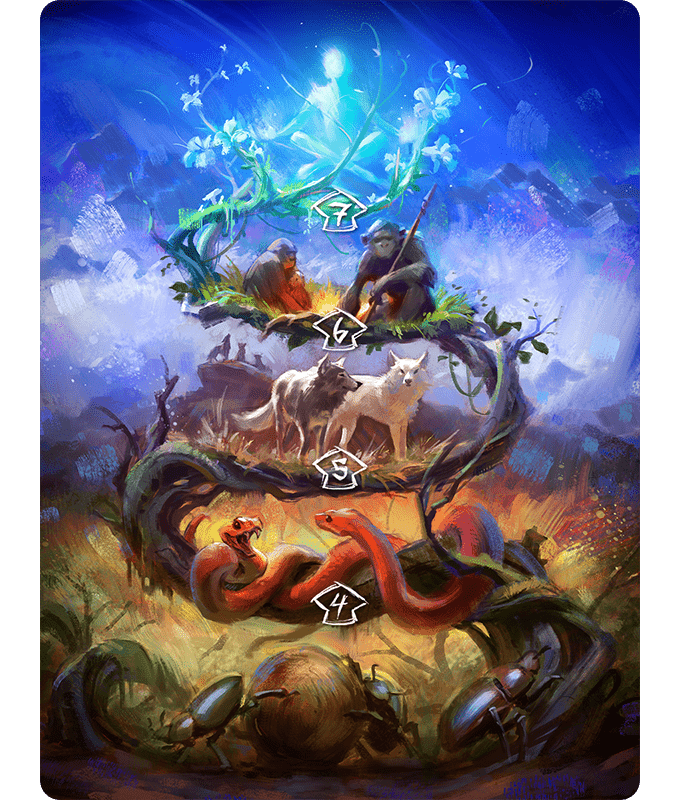
Having recently returned from PAX South, Burke says he and Bucci delivered this shtick about life as a dung beetle to Transcendence to PAX South attendants about 300 times each. And judging from Burke’s and Bucci’s jovial demeanour, they never get tired of it. Burke continues to guide me along the rules of Karmaka: there are generally two ways to play the game, Burke says, but main thing to do with the cards is score them down in front of me for points. That way, at the end of my life and once my hand is empty, I’ll have some cards sitting in front of me. In Karmaka, Burke says, these are called Deeds—which is lingo for a scored card. Once a player’s hand and deck are completely empty, the player has to look at the Deeds scored in this life, and ultimately his or her score would be the sum of the points in his or her best colour. For example: I had four red card points, and comparing my card points against the points laid out in the Karmic Ladder, I was still a dung beetle.
“Cards also have abilities as well. So every turn you’re always choosing to either to play a card for its points, or to play a card for its ability; I could never do both, I got to pick [either one of them],” Burke says. “This Salvage card is worth two green points, that’s pretty sweet, but its abilities are pretty good too. So, you got to make the trade off.”
But there’s a catch, Dave tells me, as far as deciding the “trade off” is concerned. Whenever one plays a card for its ability, it comes with a karmic cost. It’s a testament to the legendary concept of what goes around, comes around. Furthermore, Burke says that when I resolve one of my cards, I have to offer the card to my opponent, and should I benefit from that card, my opponent will benefit from that card as well. The catch to all of this is the opponent doesn’t get the card immediately; he or she would have to transfer that card into a pile called the Future Life. In Karmaka, a player’s Future Life is the set of cards that will become a player’s opening hand next game (or in the next life, in Karmaka terms). In summary, Dave says, the actions a player take in this life come back to haunt him or her in the next life.
“It’s very strategic. You have to really plan the way you want to operate in your multiple lives. It’s a very thematically-type concept,” Bucci added, all while giving credit to Burke and Boxerman with respects to Karmaka’s design.
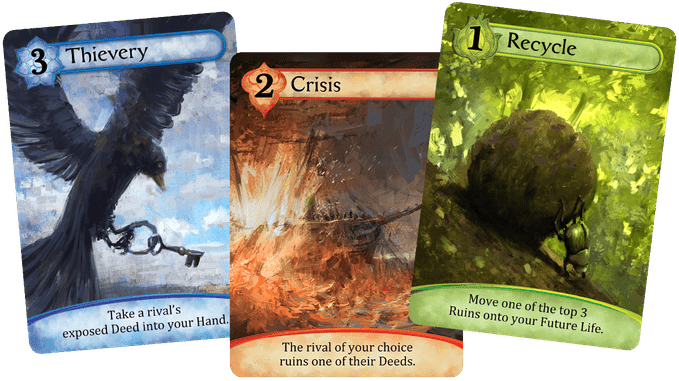
Of course, Bucci is instrumental as he provides his personal and eclectic art style in the creation of Karmaka. Bucci works alongside Burke and Boxerman, who are the primary members of Hemisphere Games. According to Bucci’s personal website, the Toronto-based freelance artist’s clientele includes Disney, Lego, LucasArts and Nelvana, just to name a few. A passionate oil painter, Bucci finds inspiration from nature; he’s outside painting life twice a week during the summertime. Bucci came to contact with Burke and Boxerman two years ago, with Burke knowing Bucci a few years back. Burke says Bucci’s artistic style meshed perfectly with what Burke and Boxerman were designing, which would eventually become Karmaka. And prior to Karmaka, both Burke and Boxerman designed the ambient and minimalist digital game Osmos. And prior to creating Osmos, both Burke and Boxerman worked in AAA studios: Boxerman spent several years at Ubisoft Montreal working on the Splinter Cell franchise; Burke was an Unreal Engine 3 developer at Epic Games, working on the Unreal Tournament and Gears of War franchises.
When Burke and Boxerman were designing Karmaka during the game’s early stages, Burke says the original concept was just the idea of karma as an economy for a game. Neither Burke nor Boxerman knew too much about true Eastern religion, or the Hindu or Buddhist sense of karma—however, the two game designers knew a lot about coffee shop, pop culture notions of what goes around, comes around. From a game design standpoint, Burke says, the concept of karma was a very germane idea. Burke says that he and Boxerman weren’t setting out explicitly to make a tabletop game in the first place, but as soon they realized a karma-themed game just sounds fun, they decided to put their plans in creating an actual board game to fruition.
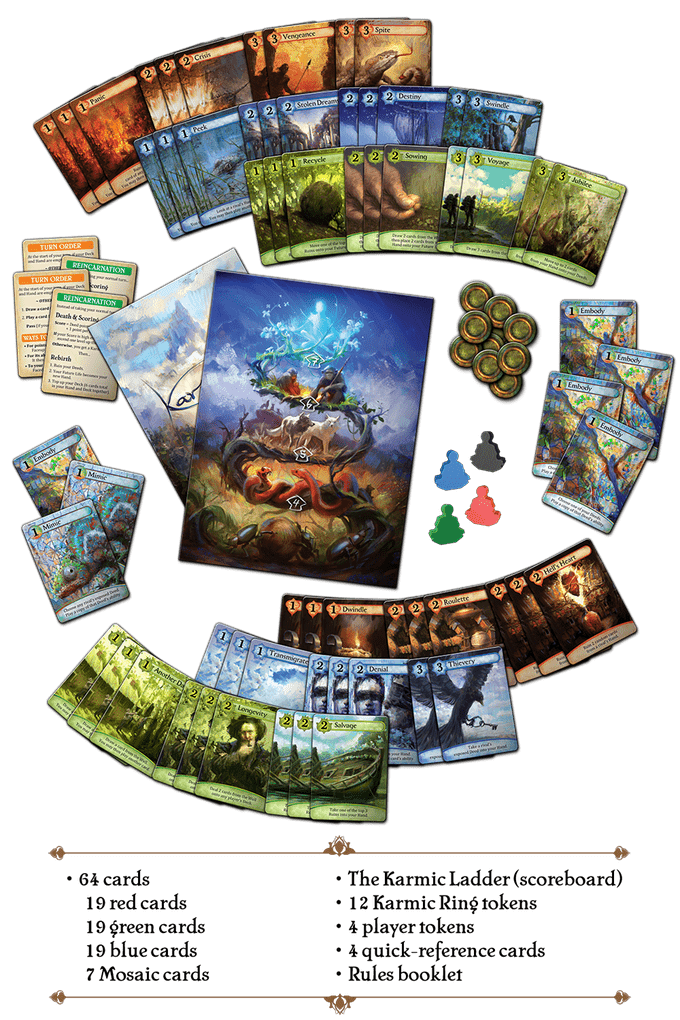
Bucci was very interested in reconnecting with Burke and Boxerman in creating Karmaka. In fact, Bucci and Burke recently had a meeting across the street from Dooney’s, discussing Karmaka’s card artwork. Bucci showed some examples of what he’d thought would suit Karmaka’s look. Burke gave Bucci four cards to take home to work his artistic magic, and the two cards Bucci started with are actually in the game—Hell’s Heart and Stolen Dreams. Since Burke and Bucci are in Toronto, they would meet with each other in person, and hold Skype meetings with Boxerman, who’s in B.C. Sometimes Burke and Boxerman would have specific ideas for Marco—the Recycle card is a shining example. Burke remembered Burke and Boxerman asking if the Recycle card could be represented by this dung beetle pushing its ball of poop. All men saw it as an unique to sell the concept of recycling—Bucci says he’s never quite seen the dung beetle being used to symbolize recycling before, so that was a winner of the bat for him.
One of the visual design goals to this game, Burke says, was to try to have the cards be thematically timeless. Karmaka is neither elves, dwarves nor zombies—or even sci-fi—but rather this classically, painterly look of Bucci in conjunction with various card themes such as crisis, vengeance, spite, panic—all the philosophical experiences of the human condition. In Karmaka, the Recycle card allows a player to retrieve a card from the Ruins—the discard pile—and into your Future Life. In looking for how to represent recycle in a universal way, in a natural setting, Burke says the dung beetle was the best choice, as opposed to the everyday recycling symbol.
“But what’s interesting, you mentioned the recycling logo that we all know,” Bucci says to me. “[Burke and Boxerman] could have done that, and it would have worked. But to give something a feel, you have to establish its universe. It’s like a movie, or video game, or anything. What universe [does a dung beetle representing recycling] exists? It’s not zombies, it’s not ogres, or anything like that. It’s this real life thing, but it feels timeless, yet somehow modern at the same time, so that was a very big target we had to hit. That was a difficult challenge for all of us to really be on the bull’s eye every card. It took two years.”
Having worked on Karmaka for two years, the Hemisphere Games team thought it was time to launch a Kickstarter campaign, as Karmaka is Hemisphere Games’ first tabletop game, and Burke says that himself and Boxerman are newcomers to the tabletop game scene. As a result, Burke says he and his team have to start again, in terms of industry connections. For Burke, launching a Kickstarter campaign as an experienced game designer gives one an excuse to put a spotlight on one’s work.
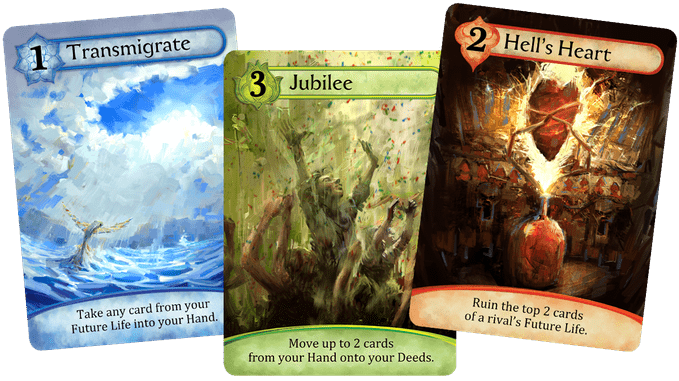
“You can justify waving a big flag and say, ‘Hey everybody, look at us!’ without coming across as ego monsters. It’s natural sales stuff. Kickstarter…is well [known] enough that you say I’m kicking a project; people know what you mean. It’s a right crowdfunding platform to do that on,” Burke says. “Also, we can raise some funds to do the first print run, become from coming from the digital space, when creating a digital product, your distribution is sort of sticking out on the server and circulating the download. The distribution fees are just server bandwidth, there’s no cost.
“It’s entirely different for physical goods. You have to manufacture things, you have to stick them on boats and freight them around the place, fulfillment, distribution, warehouse rental, returns, physical damaged goods, all that kind of stuff. Some boxes will have dents on them. So we need an infrastructure in place to either ship out replacement or replacement parts, and to do that as cost efficient as possible.”
Another positive to launching a Karmaka Kickstarter campaign, Burke says, is that it allows for the game to be tested—whether or not the game is being presented correctly, if the messaging is clear, and if people are able to catch a vision for what the game is. If the Kickstarter fails, then Burke says it could mean two things: either the game sucked, or the messaging is not coming through. But Burke says his team have done their homework in ensuring a successful Kickstarter campaign: they’ve worked with previewers and press six months prior to launching the campaign; they’ve properly accounted for stretch goal costs; they’d made sure of upcoming events during the campaign in order to capitalize on promotion; and they’ve solicited feedback from established professionals in the game industry. Karmaka was well-received at PAX South, and the game won two awards at the Boston Festival of Indie Games. IndieCade judges also praised the game. The campaign surpassed its initial goal of $20,000—the campaign currently has funded $143,388 from 4,721 backers, and it’s bound to increase.
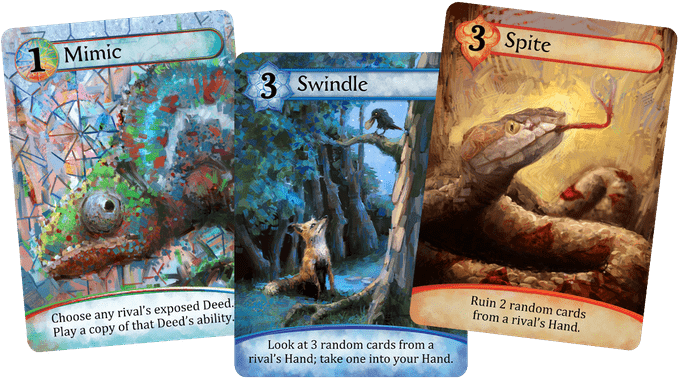
Burke and Bucci agree that constructive criticism is just as important: as part of testing Karmaka, Burke and Boxerman took to the street to play the game with the public. Part of the feedback was the public enjoyed the art Bucci did for the cards and the game box, but weren’t so keen on the initial Karmic Ladder. Removing his ego from the situation, Bucci agreed with Burke and Boxerman in creating a new Karmic Ladder. However, Bucci was busy at the time, so Burke and Boxerman hired another artist to create a new Karmic Ladder. But as Burke and Bucci would attest, it’s all about subtracting oneself from his or her ego.
Nonetheless, Burke and Bucci are still proud of what they’ve achieved with Karmaka. Part of their confidence would have to do with the fact Karmaka is a finished product. Burke says that one of the joys of being an indie company, a self-employed person as Bucci would attest, is that you get that direct connection with people—that’s cool for Burke as a creator, and it’s also cool for people too.
And it’s also good for karma as well.
Find Karmaka on Kickstarter!
